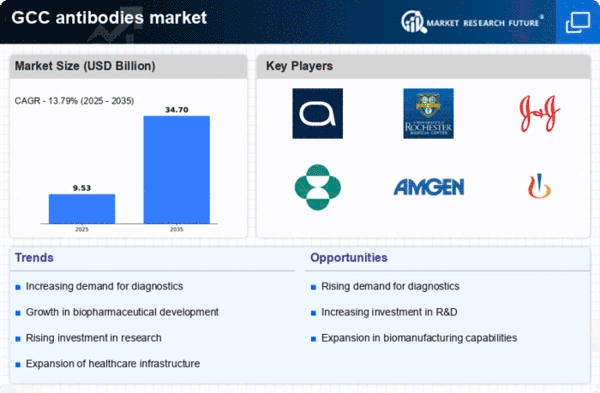Rising Healthcare Expenditure
Rising healthcare expenditure in the GCC is a significant driver for the antibodies market. Governments are increasingly investing in healthcare infrastructure and services, which is likely to enhance access to advanced medical treatments, including antibody therapies. Reports indicate that healthcare spending in the GCC is expected to reach $100 billion by 2025, reflecting a growth rate of approximately 8% annually. This increase in expenditure is anticipated to facilitate the adoption of innovative therapies, thereby driving demand for antibodies. Furthermore, as healthcare systems prioritize patient-centered care, the focus on effective treatment options is likely to bolster the antibodies market.
Growing Biopharmaceutical Sector
The biopharmaceutical sector in the GCC is experiencing robust growth, which is a key driver for the antibodies market. With an increasing number of biopharmaceutical companies establishing operations in the region, the production and distribution of antibody-based therapies are set to expand. Market data indicates that the biopharmaceutical market in the GCC is projected to reach $10 billion by 2027, reflecting a compound annual growth rate (CAGR) of 12%. This growth is likely to be fueled by advancements in biotechnology and an increasing focus on personalized medicine. As the biopharmaceutical landscape evolves, the antibodies market is expected to benefit from enhanced production capabilities and innovative therapeutic solutions.
Regulatory Support for Biologics
Regulatory support for biologics in the GCC is emerging as a crucial driver for the antibodies market. Authorities are streamlining approval processes for antibody-based therapies, which is likely to accelerate their entry into the market. Recent initiatives aimed at harmonizing regulations with international standards suggest a commitment to fostering innovation in the biopharmaceutical sector. This regulatory environment may enhance the confidence of investors and manufacturers, encouraging further investment in antibody development. As a result, the antibodies market could witness a surge in new product launches, catering to the growing demand for effective therapies in the region.
Investment in Research and Development
Investment in research and development (R&D) within the GCC is a significant catalyst for the antibodies market. Governments and private entities are increasingly allocating funds to foster innovation in biopharmaceuticals. For instance, the GCC countries have seen a rise in R&D spending, with estimates suggesting an increase of around 15% annually. This financial commitment is likely to facilitate the discovery and development of novel antibodies, enhancing treatment options for various diseases. Additionally, collaborations between academic institutions and industry players are expected to yield breakthroughs in antibody technology, further stimulating market expansion. The focus on R&D is crucial for maintaining competitiveness in the antibodies market.
Increasing Prevalence of Chronic Diseases
The rising incidence of chronic diseases in the GCC region is a pivotal driver for the antibodies market. Conditions such as cancer, autoimmune disorders, and infectious diseases necessitate advanced therapeutic solutions. As healthcare systems evolve, the demand for targeted antibody therapies is expected to surge. Reports indicate that the prevalence of cancer in the GCC is projected to increase by approximately 20% over the next decade. This trend underscores the urgent need for innovative treatments, thereby propelling the antibodies market forward. Furthermore, the growing awareness of early diagnosis and preventive healthcare is likely to enhance the adoption of antibody-based therapies, contributing to market growth.
















